- Home
- Robin McKinley
A Knot in the Grain and Other Stories Page 2
A Knot in the Grain and Other Stories Read online
Page 2
Sahath smiled sadly. “I carry the mark, lady, it is true, but no mage am I.” Jolin, staring at him, holding her worldly knowledge just behind her eyes where everything he said must be reflected through it, read truth in his eyes. “I was one once, but no longer.”
Jolin relaxed, and if she need not fear this man she could pity him, for to have once been a mage and to have lost that more than mortal strength must be as heavy a blow as any man might receive and yet live; and she saw the lines of sorrow in his face.
Lily stood staring at the man with the sad face, for she knew no more of mages than a child knows of fairy tales; she would as easily have believed in the existence of tigers or of dragons, of chimeras or of elephants; and yet Jolin’s face and voice were serious. A mage. This man was a mage—or had been one—and he could speak to her. It was more wonderful than elephants.
Sahath said, “Some broken pieces of my mage-truth remain to me, and one of these Lily wishes me to tell you: that I can speak to her—mind to mind.”
Lily nodded eagerly, and seized her old friend and mentor’s hands in hers. She smiled, pulled her lips together to whistle, “It is true,” and her lips drew back immediately again to the smile. Jolin tried to smile back into the bright young face before her; there was a glow there which had never been there before, and Jolin’s loving heart turned with jealousy and—fear reawakened. For this man, with his unreasonable skills, even if he were no proper mage, might be anyone in his own heart. Jolin loved Lily as much as any person may love another. What, she asked herself in fear, might this man do to her, in her innocence, her pleasure in the opening of a door so long closed to her, and open now only to this stranger? Mages were not to be trusted on a human scale of right and wrong, reason and unreason. Mages were sworn to other things. Jolin understood that they were sworn to—goodness, to rightness; but often that goodness was of a high, far sort that looked very much like misery to the smaller folk who had to live near it.
As she thought these things, and held her dearer-than-daughter’s hands in hers, she looked again at Sahath. “What do you read in my mind, mage?” she said, and her voice was harsher than she meant to permit it, for Lily’s sake.
Sahath dropped his eyes to his own hands; he spread the long fingers as if remembering what once they had been capable of. “Distrust and fear,” he said after a moment; and Jolin was the more alarmed that she had had no sense of his scrutiny. No mage-skill she had, but as a healer she heard and felt much that common folk had no ken of.
Lily’s eyes widened, and she clutched Jolin’s hands. Sahath felt her mind buck and shudder like a frightened horse, for the old loyalty was very strong. It was terrible to her that she might have to give up this wonderful, impossible thing even sooner than the brief span of an overnight guest’s visit that she had promised herself—or at least freely hoped for. Even his mage’s wisdom was awed by her strength of will, and the strength of her love for the aging, steady-eyed woman who watched him. He felt the girl withdrawing from him, and he did not follow her, though he might have; but he did not want to know what she was thinking. He stood where he was, the two women only a step or two distant from him; and he felt alone, as alone as he had felt once before, on a mountain, looking at a dying army, knowing his mage-strength was dying with them.
“I—” he said, groping, and the same part of his mind that had protested his halting so long before sundown protested again, saying, Why do you defend yourself to an old village woman who shambles among her shrubs and bitter herbs, mouthing superstitions? But the part of his mind that had been moved by Lily’s strength and humility answered: because she is right to question me.
“I am no threat to you in any way I control,” he said to Jolin’s steady gaze, and she thought: Still he talks like a mage, with the mage-logic, to specify that which he controls. Yet perhaps it is not so bad a thing, some other part of her mind said calmly, that any human being, even a mage, should know how little he may control.
“It—it is through no dishonor that I lost the—the rest of my mage-strength.” The last words were pulled out of him, like the last secret drops of the heart’s blood of a dragon, and Jolin heard the pain and pride in his voice, and saw the blankness in his eyes; yet she did not know that he was standing again on a mountain, feeling all that had meant anything to him draining away from him into the earth, drawn by the ebbing life-force of the army he had opposed. One of the man’s long-fingered hands had stretched toward the two women as he spoke; but as he said “mage-strength,” the hand went to his forehead. When it dropped to his side again, there were white marks that stood a moment against the skin, where the fingertips had pressed too hard.
Jolin put one arm around Lily’s shoulders and reached her other hand out delicately, to touch Sahath’s sleeve. He looked up again at the touch of her fingers. “You are welcome to stay with us, Sahath.”
Lily after all spoke to him very little that evening, as if, he thought, she did not trust herself, although she listened eagerly to the harmless stories he told them of other lands and peoples he had visited; and she not infrequently interrupted him to ask for unimportant details. He was careful to answer everything she asked as precisely as he could; once or twice she laughed at his replies, although there was nothing overtly amusing about them.
In the morning when he awoke, only a little past dawn, Lily was already gone. Jolin gave him breakfast and said without looking at him, “Lily has gone gathering wild herbs; dawn is best for some of those she seeks.” Sahath saw in her mind that Lily had gone by her own decision; Jolin had not sent her, or tried to suggest the errand to her.
He felt strangely bereft, and he sat, crumbling a piece of sweet brown bread with his fingers and staring into his cup of herb tea. He recognized the infusion: chintanth for calm, monar for clear-mindedness. He drank what was in the cup and poured himself more. Jolin moved around the kitchen, putting plates and cups back into the cupboard.
He said abruptly, “Is there any work a simple man’s strength might do for you?”
There was a rush of things through Jolin’s mind: her and Lily’s self-sufficiency, and their pleasure in it; another surge of mistrust for mage-cunning—suddenly and ashamedly put down; this surprised him, as he stared into his honey-clouded tea, and it gave him hope. Hope? he thought. He had not known hope since he lost his mage-strength; he had nearly forgotten its name. Jolin stood gazing into the depths of the cupboard, tracing the painted borders of vines and leaves and flowers with her eye; and now her thoughts were of things that it would be good to have done, that she and Lily always meant to see to, and never quite had time for.
When Lily came home in the late morning, a basket over her arm, Sahath was working his slow way with a spade down the square of field that Jolin had long had in her mind as an extension of her herb garden. Lily halted at the edge of the freshly turned earth, and breathed deep of the damp sweet smell of it. Sahath stopped to lean on his spade, and wiped his forehead on one long dark sleeve. It is near dinnertime, said Lily hesitantly, fearful of asking him why he was digging Jolin’s garden; but her heart was beating faster than her swift walking could explain.
He ate with them, a silent meal, for none of the three wished to acknowledge or discuss the new balance that was already growing among them. Then he went back to his spade.
He did a careful, thorough job of the new garden plot; two days it took him. When he finished it, he widened the kitchen garden. Then he built a large new paddock for Lily’s horse—and his own; the two horses had made friends at once, and stood head to tail in the shade at the edge of the tiny turnout that flanked the small barn. When they were first introduced to their new field, they ran like furies around it, squealing and plunging at each other. Jolin came out of the house to see what the uproar was about. Sahath and Lily were leaning side by side on the top rail of the sturdy new fence; Jolin wondered what they might be saying to each other. The horses had enough of being mad things, and ambled quietly over to ask their riders for han
douts. Jolin turned and reentered the house.
On the third day after his arrival Jolin gave Sahath a shirt and trousers, lengthened for their new owner: The shirt tail and cuffs were wide red bands sewn neatly onto the original yellow cloth; the trousers were green, and each leg bore a new darker green hem. No mage had ever worn such garb. He put them on. At the end of the week Lily gave him a black and green—the same coarse green of the trouserhems—jacket. He said, Thank you, lady, and she blushed and turned away. Jolin watched them, and wondered if she had done the right thing, not to send him away when she might have; wondered if he knew that Lily was in love with him. She wondered if a mage might know anything of love, anything of a woman’s love for a man.
He propped up the sagging cow shed where the two goats lived, and made the chicken-coop decently foxproof. He built bird-houses and feeders for the many birds that were Lily’s friends; and he watched her when he thought she did not notice, when they came to visit, perching on her hands and shoulders and rubbing their small heads against her face. He listened to their conversations, and knew no more of what passed than Jolin did of his and Lily’s.
He had never been a carpenter, any more than he had been a gardener; but he knew his work was good, and he did not care where the skill came from. He knew he could look at the things he wished to do here and understand how best to do them, and that was enough. He slept the nights through peacefully and dreamlessly.
A few days after the gift of the jacket Jolin said to him, “The leather-worker of our village is a good man and clever. He owes us for his wife’s illness last winter; it would please … us … if you would let him make you a pair of boots.” His old boots, accustomed to nothing more arduous than the chafing of stirrup and stirrup-leather, had never, even in their young days, been intended for the sort of work he was lately requiring of them. He looked at them ruefully, stretched out toward the fire’s flickering light, the dark green cuffs winking above them, and Karla’s long furry red tail curling and uncurling above the cuffs.
He went into the village the next day. He understood, from the careful but polite greetings he received, that the knowledge of Jolin’s new hired man had gone before him; and he also understood that no more than his skill with spade and hammer had gone into the tale. There was no one he met who had the skill to recognize a mage-mark, nor was there any suspicion, besides the wary observation of a stranger expected to prove himself one way or another, that he was anything more or less than an itinerant laborer. The boot-maker quietly took his measurements and asked him to return in a week.
Another week, he thought, and was both glad and afraid. It was during that week that he finished the paddock for the horses. He wanted to build a larger shed to store hay, for there was hay enough in the meadowland around Jolin’s house to keep all the livestock—even a second horse, he thought distantly—all the winter, if there was more room for it than the low loft over the small barn.
In a week he went back to fetch his boots; they were heavy, hard things, a farmer’s boots, and for a moment they appalled him, till he saw the beauty of them. He thanked their maker gravely, and did not know the man was surprised by his tone. Farmers, hired men, took their footgear for granted; he had long since learned to be proud of his craft for its own sake. And so he was the first of the villagers to wonder if perhaps there was more to Jolin’s hired man—other than the fact, well mulled over all through Rhungill, that Jolin had never before in over twenty years been moved to hire anyone for more than a day’s specific job—than met the eye. But he had no guess of the truth.
Sahath asked the boot-maker if there was someone who sold dry planking, for he had all but used Lily and Jolin’s small store of it, till now used only for patching up after storms and hard winter weather. There were several such men, and because the leather-worker was pleased at the compliment Sahath paid him, he recommended one man over the others. Sahath, unknowing, went to that man, who had much fine wood of just the sort Sahath wanted; but when he asked a price, the man looked at him a long moment and said, “No charge, as you do good work for them; you may have as much as you need as you go on for them. There are those of us know what we owe them.” The man’s name was Armar.
Sahath went in his heavy boots to the house he had begun in secret to call home. He let no hint of the cost to his pride his workman’s hire of sturdy boots had commanded; but still Jolin’s quick eyes caught him staring at the calluses on his long-fingered hands, and guessed something of what he was thinking.
A week after he brought his boots home he began the hay shed. He also began to teach Lily and Jolin their letters. He had pen and paper in his saddlebags, and a wax tablet that had once been important in a mage’s work. When he first took it out of its satchel, he had stood long with it in his hands; but it was silent, inert, a tool like a hammer was a tool and nothing more. He brought it downstairs, and whittled three styluses from bits of firewood.
“If you learn to write,” he said, humbly, to Jolin, “Lily may speak to you as well as she may speak to any wandering … mage.” It was all the explanation he gave, laying the pale smooth tablet down on the shining golden wood of the table; and Jolin realized, when he smiled uncertainly at her and then turned to look wistfully at Lily, that he did love her dearer-than-daughter, but that nothing of that love had passed between them. Jolin had grown fond of the quiet, weary man who was proving such a good landsman, fond enough of him that it no longer hurt her to see him wearing her husband’s old clothes which she herself had patched for his longer frame; and so she thought, Why does he not tell her? She looked at them as they looked at each other, and knew why, for the hopelessness was as bright in their eyes as the love. Jolin looked away unhappily, for she understood too that there was no advice she could give them that they would listen to. But she could whisper charms that they permit themselves to see what was, and not blind themselves with blame for what they lacked. Her lips moved.
Each evening after that the two women sat on either side of him and did their lessons as carefully as the students of his mage-master had ever done theirs, although they had been learning words to crack the world and set fire to the seas. Sahath copied the letters of the alphabet out plainly and boldly onto a piece of stiff parchment, and Jolin pinned it to the front of the cupboard, where his two students might look at it often during the day.
Spring turned to summer, and Sahath’s boots were no longer new, and he had three more shirts and another pair of trousers. The last shirt and trousers were made for him, not merely made over; and the first shirt had to be patched at the elbows. The goats produced two pair of kids, which would be sold at the fall auction in Teskip. Summer began to wane, and Sahath began to wander around the house at twilight, after work and before supper, staring at the bottles of herbs, the basket of scraps from which Jolin made her sachets, and outside in the garden, staring at the fading sun and the lengthening shadows.
Jolin thought, with a new fear at her heart, He will be leaving us soon. What of Lily? And even without thought of Lily she felt sorrow.
Lily too watched him pacing, but she said nothing at all; and what her thoughts were neither Jolin nor Sahath wished to guess.
One evening when Lily was gone to attend a sick baby, Sahath said, with the uneasy abruptness Jolin had not heard since he had asked one morning months ago if there was any work for a simple man’s strength: “It is possible that I know someone who could give Lily her voice. Would you let her travel away with me, on my word that I would protect her dearer than my own life?”
Jolin shivered, and laid her sewing down in her lap. “What is this you speak of?”
Sahath was silent a moment, stroking grey tabby Annabelle. “My old master. I have not seen him since I first began … my travels; even now I dread going back.…” So much he could say after several months of farmer’s labor and the companionship of two women. “He is a mage almost beyond the knowing of the rest of us, even his best pupils.” He swallowed, for he had been one of these. “But h
e knows many things. I—I know Lily, I think, well enough to guess that her voice is something my master should be able to give her.”
Jolin stared unblinking into the fire till the heat of it drew tears. “It is not my decision. We will put it to Lily. If she wishes to go with you, then she shall go.”
Lily did not return till the next morning, and she found her two best friends as tired and sleepless-looking as she felt herself, and she looked at them with surprise. “Sahath said something last night that you need to hear,” said Jolin; but Sahath did not raise his heavy eyes from his tea-cup.
“His … mage-master … may be able to give you your voice. Will you go with him, to seek this wizard?”
Lily’s hands were shaking as she set her basket on the table. She pursed her lips, but no sound emerged. She licked her lips nervously and whistled: “I will go.”
They set out two days later. It was a quiet two days; Lily did not even answer the birds when they spoke to her. They left when dawn was still grey over the trees. Jolin and Lily embraced for a long time before the older woman put the younger one away from her and said, “You go on now. Just don’t forget to come back.”
Lily nodded, then shook her head, then nodded again and smiled tremulously.
“I’ll tell your parents you’ve gone away for a bit, never fear.”
Lily nodded once more, slowly, then turned away to mount her little bay horse. Sahath was astride already, standing a little away from the two women, staring at the yellow fingers of light pushing the grey away; he looked down startled when Jolin touched his knee. She swallowed, tried to speak, but no words came, and her fingers dug into his leg. He covered her hand with his and squeezed; when she looked up at him, he smiled, and finally she smiled back, then turned away and left them. Lily watched the house door close behind her dearest friend, and sat immobile, staring at the place where Jolin had disappeared, till Sahath sent his horse forward. Lily awoke from her reverie, and sent the little bay after the tall black horse. Sahath heard the gentle hoofbeats behind him, and turned to smile encouragement; and Lily, looking into his face, realized that he had not been sure, even until this moment, if she would follow him or not. She smiled in return, a smile of reassurance. Words, loose and filmy as smoke, drifted into Sahath’s mind: I keep my promises. But he did not know what she had read in his face, and he shook his head to clear it of the words that were not meant for him.

 Spindle's End
Spindle's End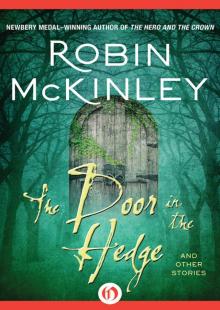 The Door in the Hedge: And Other Stories
The Door in the Hedge: And Other Stories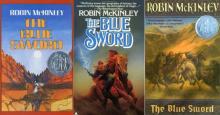 The Blue Sword
The Blue Sword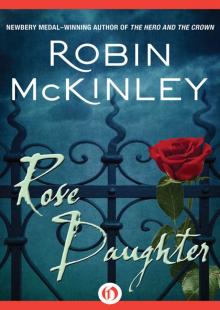 Rose Daughter
Rose Daughter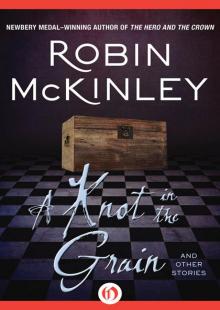 A Knot in the Grain and Other Stories
A Knot in the Grain and Other Stories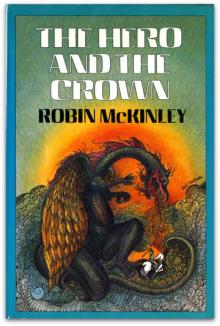 The Hero And The Crown
The Hero And The Crown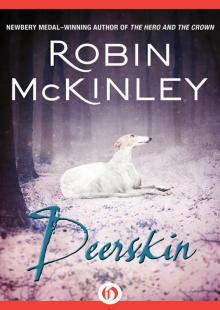 Deerskin
Deerskin Sunshine
Sunshine Beauty: A Retelling of the Story of Beauty and the Beast
Beauty: A Retelling of the Story of Beauty and the Beast Shadows
Shadows Pegasus
Pegasus Chalice
Chalice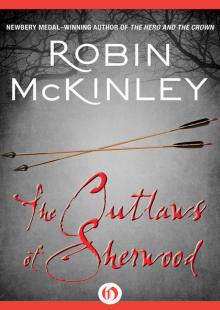 The Outlaws of Sherwood
The Outlaws of Sherwood Fire: Tales of Elemental Spirits
Fire: Tales of Elemental Spirits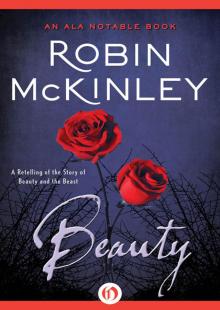 Beauty
Beauty Dragon Haven
Dragon Haven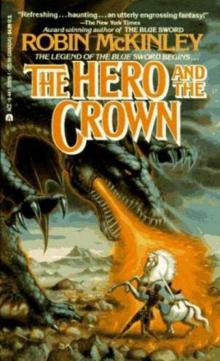 The Hero And The Crown d-2
The Hero And The Crown d-2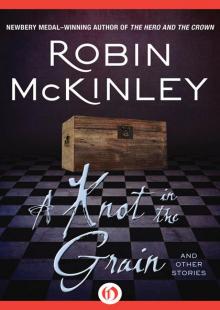 A Knot in the Grain
A Knot in the Grain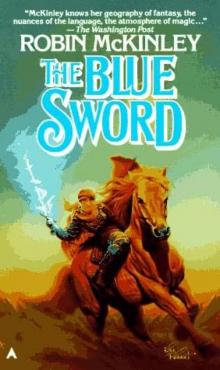 The Blue Sword d-1
The Blue Sword d-1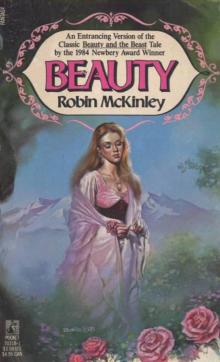 Beauty (v1.2)
Beauty (v1.2)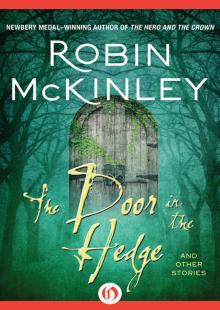 The Door in the Hedge
The Door in the Hedge